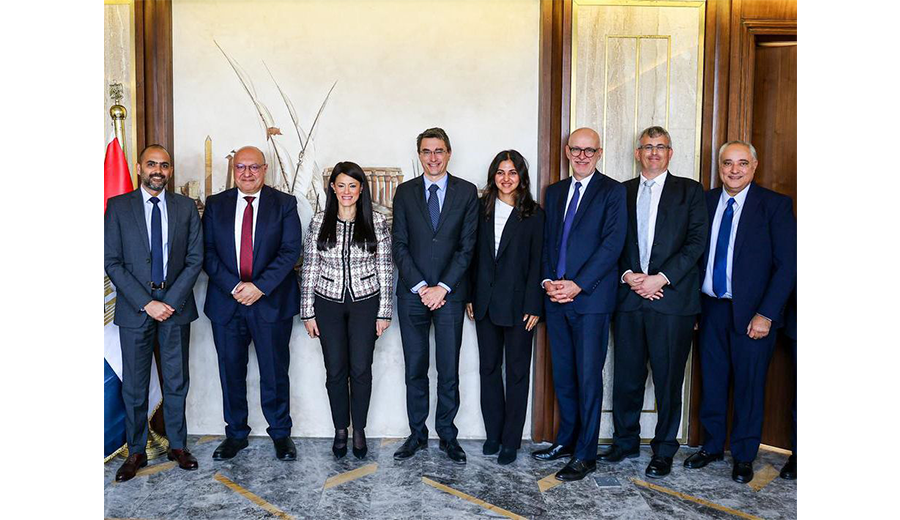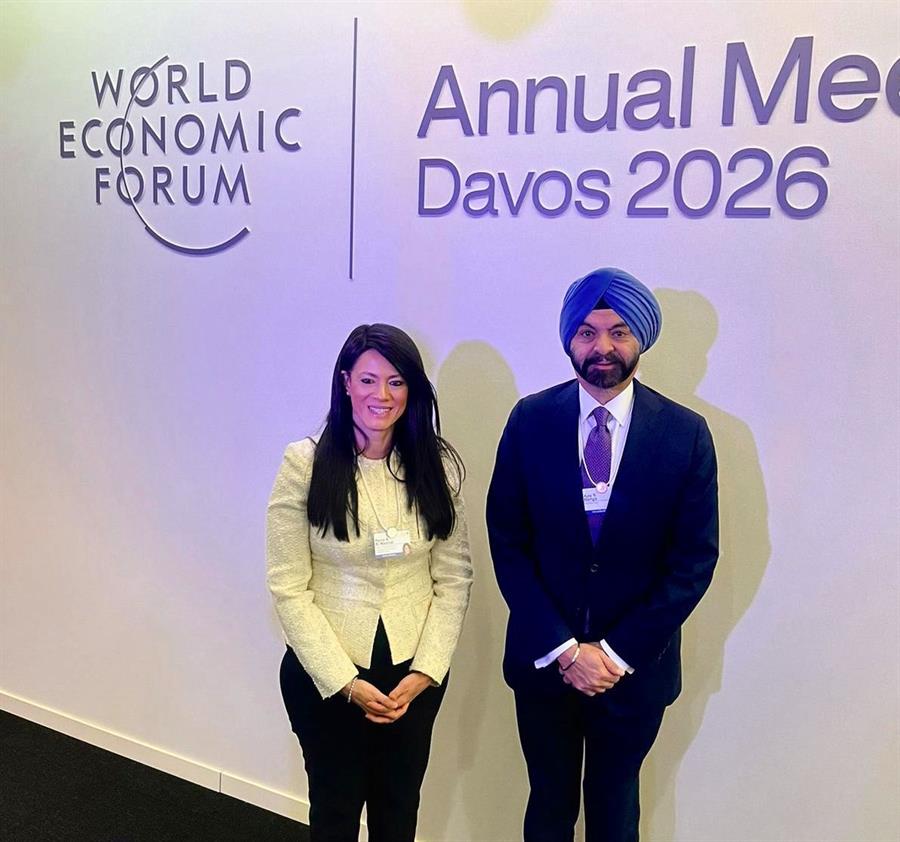During her participation as the Minister of Planning, Economic Development, and International Cooperation in the conference "Industry and Environment Towards Green Development", Dr. Rania A. Al-Mashat
29 July 2024
During her participation as the Minister of
Planning, Economic Development, and International Cooperation in the conference
"Industry and Environment Towards Green Development",
Dr. Rania A. Al-Mashat:
Integrating environmental standards into sectoral development plans to achieve comprehensive and sustainable development.
The industrial sector is a major contributor to the national economy, and its adherence to environmental standards enhances its sustainability and investment attractiveness.
Cooperation with international partners to support the state's efforts in localizing industry through facilitated financing mechanisms, technical support, and diagnostic reports.
We are working to improve the business climate and policies supporting the private sector through structural reforms.
The government places significant importance on developing the national industry as one of the pillars for achieving sustainable economic development.
$3 billion in financing from international partners to implement 32 projects that directly and indirectly enhance industrial development efforts.
Green industries increase the competitiveness of Egyptian exports and promote inclusive economic development.
H.E. Dr. Rania A. Al-Mashat emphasized that
transitioning to green industrial development promotes sustainable growth and
is a key component in addressing climate change. H.E. Minister Al-Mashat noted
that these efforts align with Egypt's priorities to enhance sustainable
development through the integration of environmental, social, economic, and
technological dimensions. Sustainable industries are the cornerstone of
economic growth and climate action, enhancing economic competitiveness and
providing new job opportunities. Green industries also bolster the
competitiveness of Egyptian exports.
This statement was made during her
participation in the conference "Industry and Environment Towards Green
Development," organized by the Ministries of Industry and Environment,
with support from the European Union, the European Investment Bank, the German
Agency for International Cooperation, the German Development Bank, and the
French Development Agency, and attended by Lieutenant General Kamel Al-Wazir,
Deputy Prime Minister for Industrial Development and Minister of Industry and
Transport, Dr. Yasmin Fouad, Minister of Environment, Engineer Mohamed
El-Sewedy, Chairman of the Federation of Egyptian Industries, Dr. Sherif
El-Gebaly, Head of the Environmental Compliance Office at the Federation of
Egyptian Industries, and other representatives from national entities and
development partners.
The Minister of Planning, Economic
Development, and International Cooperation explained that the ministry is
collaborating with all relevant ministries, particularly the Ministries of
Environment and Industry, to incorporate environmental and climate dimensions
into sustainable development plans. Achieving a "comprehensive and
sustainable ecosystem" is a primary goal of Egypt's Vision 2030, reflecting
the state's commitment to preserving future generations' rights by increasing
the share of green public investments in the economic and social development
plan.
H.E. Minister Al-Mashat asserted that industry
is one of the most important components of the Egyptian economy, contributing
over 15% to the Gross Domestic Product. With the state's focus on industrial
development as a top priority and the establishment of a ministerial committee
dedicated to implementing President Abdel Fattah El-Sisi's directives, efforts
are concentrated on increasing Egypt's net exports and encouraging local
products. Therefore, adherence to environmental standards and the use of modern
technology are crucial for enhancing industry sustainability, improving
resource efficiency, and reducing harmful environmental impacts, thereby
supporting the implementation of the 2030 Sustainable Development Plan.
The ministry is working with all international
development partners to support the country's industrial development efforts by
accessing facilitated and innovative financing tools, providing technical
support and expertise, and preparing diagnostic reports and sectoral studies.
The ministry's portfolio includes 32 ongoing projects valued at over 3 billion
dollars in the industrial development sector, focusing on four main areas:
Enhancing infrastructure and localizing
promising industries: By providing necessary funding for major projects such as
seaports, dry ports, and logistical networks, boosting national production capabilities
and supporting the localization of industry in Egypt.
Investing in human capital, research,
development, and innovation: Through training programs, technical support,
building youth capacities, and fostering a culture of innovation to stimulate industrial
development and economic growth through the knowledge economy.
Green transition: By offering financing and
expertise that strengthen the Egyptian industry's ability to address
environmental challenges and promote sustainable development.
Supportive policies and structural reforms:
Development partners play a crucial role in improving the business environment
and supporting policies by providing necessary consultations and funding to
enhance the business climate through streamlined procedures and supportive
legislation.
H.E. Dr. Al-Mashat confirmed that the ministry
is coordinating with all relevant parties and inviting the private sector and
entrepreneurs to actively participate in development through effective
communication mechanisms. To bridge the information gap and facilitate
connections between the private sector and development partners, the ministry
has launched the "HAFIZ Platform for Technical and Financial Support to
the Private Sector," an electronic platform containing all financial tools,
technical support services, initiatives, and tenders offered by international
development partners.
In this context, the National Initiative for
Smart Green Projects is one of the most important initiatives under the
supervision of the Ministry of Planning, Economic Development, and
International Cooperation. The initiative aims to stimulate innovative ideas
and implement environmental solutions across all governorates of Egypt to
address climate change challenges, in line with the state's efforts towards
green transition and sustainable development. The ministry encourages project
owners to present local solutions for climate change, showcase them on an
interactive map, and connect them with funding entities to attract investments,
aligning with the state's goal to localize Sustainable Development Goals at the
governorate level.
The Minister highlighted the ministry's
efforts to enhance strategic partnerships with development partners through
bilateral and multilateral cooperation for sustainable industry. Recently, a
project for "Sustainable Green Industry" was signed during the Egyptian-European
Investment Conference, with facilitated funding from the European Investment
Bank amounting to 135 million euros and a grant from the European Union of 30
million euros, managed by the European Investment Bank. This project extends
from European development partners' funded programs, starting with the
"Industrial Pollution Control" program in its three phases.
The program aims to support the green
transition in the industrial sector by implementing climate and environmental
sustainability measures, covering all governorates with the goal of eliminating
industrial pollution and decarbonizing the industrial sector through renewable
energy, green hydrogen, and biogas.
H.E. Minister Al-Mashat also mentioned that,
in light of the financing package for Egypt within the framework of upgrading
relations with the European Union to a comprehensive strategic partnership
level, the first phase of the Memorandum of Understanding on
"Macroeconomic Support and Budget Deficit Assistance" worth €1
billion was signed. This aims to implement a matrix of structural reforms,
policies, and procedures to enhance the competitiveness of the Egyptian
economy, improve the business climate, support macroeconomic stability, and
drive the green transition. These three pillars represent the core of budget
support programs funded by the World Bank, the African Development Bank, and
various development partners.
H.E. Minister Al-Mashat added that the
Ministry of Planning, Economic Development, and International Cooperation, in
coordination with the European Union, is working on setting priorities of
mutual interest to utilize the allocated financing for investment guarantees
worth €1.8 billion in areas of common interest, including energy transition and
security, digital transformation, food security, green transition, and resource
efficiency.
These strategic partnerships aim to implement
developmental projects in priority economic sectors such as industry
localization, environment, energy efficiency, renewable energy, sanitation, and
urban development through facilitated financing, grants, and debt swaps.
H.E. Minister Al-Mashat referred to the
political announcement issued by the governments of Egypt, Germany, and the
United States at the COP27 climate summit, which involves financing several
programs supporting the energy axis of the "NWFE" program under debt
swaps to increase the use of renewable energy sources, reduce greenhouse gas
emissions, and advance the green transition.
In conclusion, H.E. Dr. Al-Mashat affirmed
that the Ministry of Planning, Economic Development, and International
Cooperation is working to advance the state’s efforts to focus on the two main
elements: industrial development and human capital development, whether through
public investments or cooperation with various international funding
institutions and partners, aiming to achieve the overarching goal of creating a
competitive economy attractive to investments and enhancing the competitiveness
of the Egyptian economy to promote inclusive and sustainable growth.









